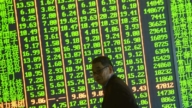【新唐人2013年12月23日訊】大陸貨幣市場的資金緊張情況不斷加劇,銀行間同業拆款利率升到6月份以來的最高水平。同時,「錢荒」壓力也開始蔓延到其他市場。上海股市連續多日下跌,國債價格也不斷下挫。為緩解危機,大陸央行再次向市場注入超過3,000億人民幣的流動性資金。下面請看報導。
12月19號,上海銀行間7天期隔夜拆借利率一舉突破7%的大關,此後更是連續攀升,讓人感覺彷彿「錢荒」捲土重來。
大陸金融分析師任中道:「年底有各種銀行的考核,還有財政存款的提取,所以它的錢就很緊張。」
大陸銀行業手中無糧、年關難過的困境,不但導致銀行間利率連創新高,股票證券市場也因此大受衝擊、連續下跌。20號,大陸A股市場再度出現放量大跌,上證指數不僅擊穿了2100點整數的關口,更是創下了罕見的9連跌。
在此之前,12月13號閉幕的中共中央經濟工作會議,決定要維持穩健的貨幣政策,所以央行對於這次的錢荒,並沒有立即出手救市。但隨著危機的加劇,央行不得不再次放水注資。
20號,大陸央行表示,已連續三天,纍計向市場注入超過3000億元的流動性資金。央行指稱,目前銀行體系超額備付已超過1萬5000億元,為歷史同期相對較高水平。外界分析,大量的資金投放市場,雖然可能使「錢荒」得到部分緩解,但也會增大物價上漲的壓力。
任中道:「錢越多,那就說明越不值錢。物價會漲起來,然後通貨膨脹就會更加的嚴重。」
北京《國情內參》期刊首席研究員鞏勝利,也向《新唐人》表示,在正常國家裏,貨幣投放增加之後,政府要設法通過發紅包等方式來增加老百姓的收入,保證老百姓的生活水平。
北京《國情內參》首席研究員 鞏勝利:「但是中國近64年以來,一直沒有做過這樣的事情。儘管貨幣投放量大,但是老百姓的收入沒有增加。再加上人民幣的貶值、對國內的貶值,所以可能會造成老百姓的生活水平有所下降。」
今年6月左右,大陸曾發生非常嚴重的「錢荒」,銀行間隔夜拆借利率一度超過10%。後來,央行連續五週緊急投放3500多億元資金,才使「錢荒」得到緩解。
鞏勝利分析,大陸「錢荒」出現的關鍵領域是各國有企業、房地產、鋼鐵、能源等行業。人們無從知曉這背後的資金到底最終流向了何處。
鞏勝利:「所以這些都是一些不確定的因素。不知道甚麼時候它可能會爆發,也不知道甚麼時候(需要)大筆的資金。它是市場經濟國家沒有的這種情況,因為它很多時候不在陽光下,你也看不到。」
鞏勝利還談到了央行這次投放貨幣的國際因素。他表示,美國已經決定減少美元投放量,這種情況下,中國就必須加大投放貨幣,才能保持人民幣與美元的平衡。
據報導,18號「美聯儲(Fed)」對外宣佈,從明年1月起,每月的購債金額將從850億減到750億美元,開始逐步停止「量化寬鬆」(Quantitative easing,簡稱QE)政策。
這表示,美國國債的收益率將上升,市場流動性資金緊缺,美元匯率走高,因此美國市場以外的資金開始回流美國本土,中國大陸境內的熱錢很可能會減少,「錢荒」加劇。
而任中道則指出,其實中國大陸的「錢荒」是一直存在的,只是有時候更嚴重一些。中共目前對錢荒的處理是進退兩難。央行放水注資的做法也是治標不治本,中國大陸的「錢荒」將一直持續下去。
採訪/易如 編輯/李謙 後製/蕭宇
China central bank injects more on cash crunch
China is experiencing a severe cash shortage,
and interbank borrowing costs have risen to their highest
since June this year.
The cash crunch has extended to other markets as well.
Shanghai stocks have been falling for several days and
bond prices have also continued to fall.
To ease the crisis, China’s central bank has again injected over
300 billion yuan ($49.2 billion) of liquidity into the market.
Here’s the report.
On Dec. 19, Shanghai’s short-term liquidity borrowing cost,
or the seven-day repurchase agreement rate,
broke the 7 % benchmark.
The continued rise seems like
a reoccurrence of this summer’s cash crunch.
Ren Zhongdao, financial analyst: “The liquidity squeeze was
caused by the year-end assessment and banks’ fiscal deposits
getting withdrawn."
This cash crunch in the banks at the end of year has created
new high in interest rates and hit the stock market hard.
On Dec. 20, China’s Shanghai Composite Index dipped
below 2,100 points, and moved down for
nine consecutive days as of Friday.
During the Central Economic Work Conference, which ended
on Dec. 13, the Chinese Communist regime decided to
maintain a prudent monetary policy.
China’s central bank did not react immediately to the money
shortage until the problem recently got serious and the
central bank decided to inject liquidity again.
On Dec. 20, China’s central bank said more than
300 billion yuan of liquidity had been injected to the market
over three days.
The central bank says that the banking system has
excess reserves of over 1.5 trillion yuan ($247 billion),
which is considered to be a relatively high level.
Analysts say that mass liquidity will relieve some of the
cash crunch, but also increases the likelihood of inflation.
Ren Zhongdao: “More liquidity means less value.
Prices will go up and inflation will be more severe."
Beijing-based senior journalist Gong Shengli tells NTD
that an ordinary government will normally ensure the
living standard by issuing benefits to increase people’s income
after injecting liquidity.
Gong Shengli, senior Beijing journalist: “But for nearly the
past 64 years, China has not done that.
Though much liquidity was injected,
the general public’s earnings did not increase.
[China’s standard of living] falls further
with the depreciation of the yuan."
In June, the Chinese interbank rate surged to 10 percent
overnight because of the cash squeeze.
The situation only eased up after the central bank made an
emergency injection of more than 350 billion yuan ($58 billion)
over five consecutive weeks.
Gong Shengli says that this cash shortage shows up in several
key sectors, such as China’s state owned enterprises,
the real estate, steel, and energy industries and so on.
No one has any idea where all the money has ended up.
Gong Shengli: “There are some uncertain factors.
No one knows when the crisis will happen and
when the money is needed.
This is something free market countries do not experience.
We don’t see it [the money] because it’s not out in the open."
Gong Shengli also says there is an international factor in the
central bank’s decision to inject liquidity.
He says the U.S. has decided to reduce injections,
and so China has to inject large amounts of money
to keep a balance between the dollar and the yuan.
According to Dec. 18 reports, the U.S. Federal Reserve
will reduce monthly purchases of assets from $85 billion to
$75 billion to phase out the Quantitative Easing program.
This means that U.S. Treasury yields will rise,
market liquidity will run short, and the dollar will rise.
Thus overseas capital will return to the U.S., and the
hot money in mainland China may reduce,
resulting in a tighter cash crunch for mainland China.
Ren Zhongdao says that the cash squeeze has always existed
in China, it’s only a matter of the severity.
China’s Communist regime faces a dilemma
over handling the cash crunch.
Since the central bank’s injecting liquidity will not solve the
fundamental issue, the cash crunch in China can only continue.
Interview/Yiru Edit/LiQian Post-Production/XiaoYu


























